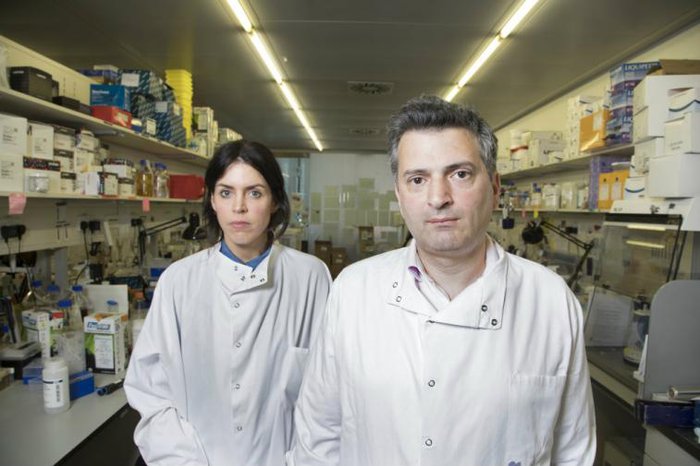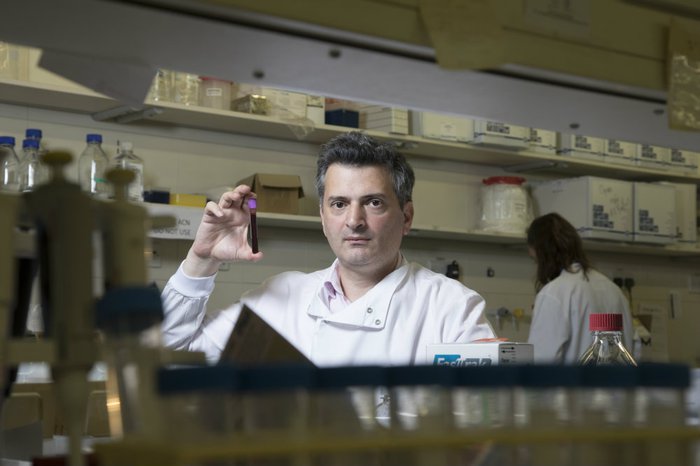By the end of the programme, I didn’t feel despair. I felt hope.
War in the Blood, a new BBC documentary follows two people who received CAR-T therapy, a groundbreaking new treatment for blood cancer, as part of a clinical trial. Kate, our Senior Support Services Manager, reviews the documentary

Dr Martin Pule, CAR-T researcher
"Could CAR-T work for me...?"
This is one of the most common questions we’re asked on the support line.
After being described by the media as a potential new ‘miracle cure’, it’s totally understandable that people are keen to know if CAR-T is better than their current treatment, or something that could work for them in the future.
And ultimately, for many who call us, it may be their last hope when nothing else has worked.
BBC Two’s War in the Blood looked at the use of CAR-T therapy, it’s impact on patients, and the potential impact on the landscape of cancer treatments for the future.
The documentary told the story of two leukaemia patients, Graham and Mahmoud. Like many of the people who contact us, they’d already put their bodies through very intense treatments, and had to deal with numerous relapses when these treatments didn’t work.
CAR-T had given them fresh hope
We met them at the point where their treatment options were very limited, but thanks to investment in research, CAR-T treatment was available.
The CAR-T clinical trial provided Graham hope despite his wife’s reservations. Eighteen year old Mahmoud was also committed to giving this new treatment a shot. Claire Roddie, the Haematology Consultant managing their care at UCLH talked candidly about how patients view treatment – how they often distance themselves from the possibility that it might not work while there’s still a glimmer of hope that they could be ‘cancer free’.

As with any clinical trial, questions about how safe CAR-T is, and whether it works in all patients were raised throughout the emotionally charged documentary. Would you be willing to be a ‘human guinea pig?’ .
Footage of Graham’s wife and Mahmoud’s mother grappling with this idea was perhaps, for me, the hardest part to watch. Both trying desperately to continue to be wholly supportive – a champion of hope, a pillar of strength – but at points the anguish, desperation and fear they felt was crystal clear.
Making a huge decision
Despite the agony Graham had been through with his first, unsuccessful round of CAR-T therapy, he was given a choice of a second, and then a third dose.
Graham could have made the decision to not have a third dose of CAR-T – to live out his days with his family in the comfort of his own home. But the pressure and complexity of the choice was huge.
Mahmoud, whose treatment worked initially but soon stopped working, was forced to confront the fact that he had run out of options.
Conversations about the realities of life and death are ones we often shy away from. But ultimately they’re some of the most important conversations we’ll ever have.
Very sadly, Graham and Mahmoud both died after having CAR-T therapy. However, by the end of the programme, although I felt sadness, I didn’t feel despair.
In fact, I felt hope.
A legacy for others to build on
Dr Martin Pule, who leads the CAR-T programme at UCL, made it clear that there was no doubt that CAR-T could work. He paid tribute to those that didn’t make it as ‘invaluable contributors’ to the development of this treatment, which could go on to help many more people in the future.
Graham’s wife was comforted by the fact that her husband was able to fulfil his wish and ‘be part of making other people’s lives better.’
War on the Blood shone a light on the uncertainty, the highs, the lows and the complexity of being part of a clinical trial for new drugs like CAR-T. But even more than that, it highlighted the crucial role played by people like Mahmoud and Graham, without whom we simply could not make progress.
